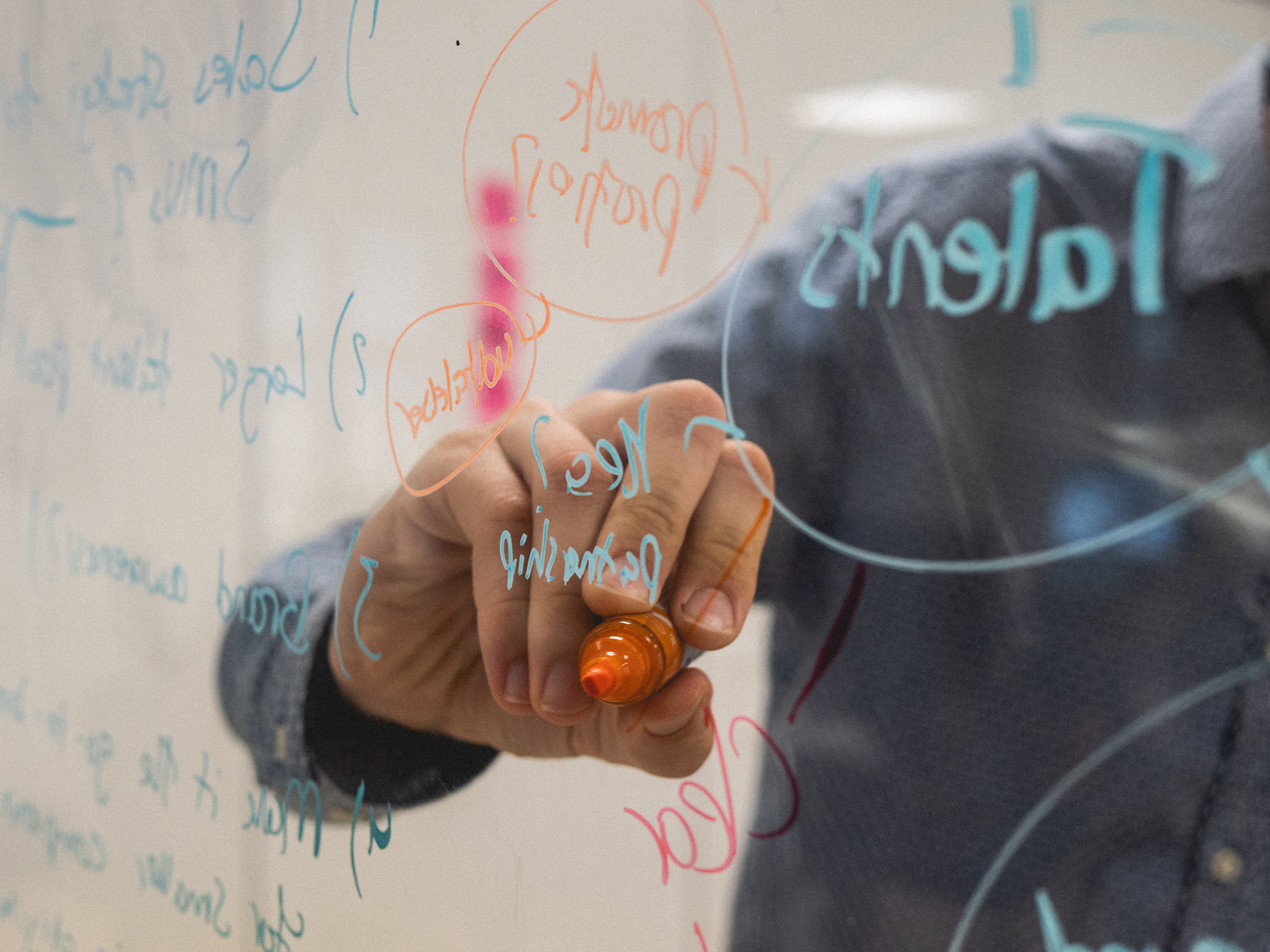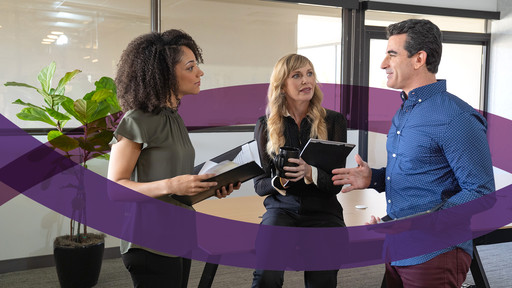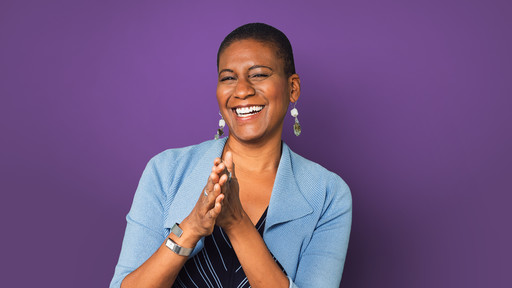Rise x LinkedIn Learning
LinkedIn learning offers over 16,00 skills-development courses, and you can access them all for free as part of your Man Met studentship (usual cost £29.99/month!)
And thanks to our exclusive partnership, you'll automatically earn Rise points for completing them.
Here's how to get started:
- Go to linkedin.com/learning-login
- Enter mmu.ac.uk - this step is important!
- Click Continue to The Manchester Metropolitan University
- Enter your username in the following format: MMUID@stu.mmu.ac.uk, eg. 12345678@stu.mmu.ac.uk
- Enter your usual university password
Note: Rise points will be automatically awarded at 7am each morning, based courses that you have fully completed in the previous 24 hours
Learn how to excel in any job by mastering essential professional soft skills. Develop the skills that hiring managers value most, from emotional intelligence and critical thinking to teamwork and addressing unconscious bias.
Skills you’ll learn:
• Emotional intelligence and resilience
• Communication and listening skills
• Collaboration skills
• Critical thinking and decision making
Note: To view a version of this learning path with audio descriptions, go directly to LinkedIn Learning here: Professional Soft Skills Learning Pathway (with Audio Descriptions).
Once you’ve completed the below courses head here to take your test and get your certificate! Don’t forget to share on your LinkedIn profile!
View Gemma's LinkedIn Newsletter Emotional intelligence can help you build effective relationships at work. Executive coach and organizational psychologist Gemma Roberts explains what emotional intelligence (EQ) is and why it's important. She helps you become more self-aware so that you can identify triggers that may hijack your performance. Gemma also helps you align your intentions and your impact so that you can build strong and collaborative relationships.
View Tatiana's LinkedIn Newsletter Have trouble getting by when the going gets tough? Everyone wants to perform well when the pressure's on, but a lot of us withdraw in times of stress or adversity. If you can build your resilience, you'll have an easier time facing new challenges and earn a valuable skill to offer employers. In this course, Kelley School of Business professor and professional communications coach Tatiana Kolovou explains how to bounce back from difficult situations, by building your "resiliency threshold." She outlines five training techniques to prepare for difficult situations, and five strategies for reflecting on them afterward. Find out where you are on the resilience scale, identify where you want to be, and learn strategies to close the gap. Note: This course was featured in Market Watch, Inc., Fortune, Forbes, and Entrepreneur.
When we’re caught off guard by a job loss or the crumbling of a personal relationship, it can be tough to move forward. But while we can’t avoid these kinds of unexpected changes, we can control how we deal with them. In this short course, Dr. Todd Dewett explains how you can harness the power of change for your benefit and the benefit of those around you. Learn how to put change in the proper context, create the right perspective, and ultimately become more resilient.
The pace of change and volume of information we encounter in daily life make it hard to think through decisions. Instead, people often rely on biases and rules of thumb, which trap them into drawing faulty conclusions. The most successful teams use critical thinking—objective and rational analysis—to illuminate the wisest conclusions. This course prepares leaders to hone the critical thinking skills of their entire organization. Learn how to upgrade critical thinking to avoid deceiving fallacies, spot misleading cognitive biases, craft better arguments, hone judgment, and improve decision-making. Instructor Becki Saltzman teaches skills that will improve how your company or team innovates, tackles challenges, and responds to change.
View Rachel's LinkedIn Newsletter Author and Oxford University Trust Fellow Rachel Botsman has studied the ins and outs of trust for over a decade. Based on her best-selling book Who Can You Trust?, this course reveals the powerful ways trust shapes our personal and professional lives—enabling us to cope with uncertainty, take risks, and be vulnerable with others. Rachel shares a specific language for understanding what trust is and how it works. She also unpacks the behaviors that are key to earning the trust of others and developing trustworthy cultures, plus the common factors that cause trust to break down and what to do when it does.
View Chris's LinkedIn Newsletter Whatever job you do, it’s likely you work in a team. Your performance will depend on your ability to work successfully with other people. Learn the qualities of effective teams and the role you, as a team member, play in creating a healthy, productive team in this course taught by management trainer Chris Croft. In addition to the importance of knowing your own strengths and weaknesses, Chris emphasizes the significance of delivering what is expected of you, listening to other team members, communicating clearly, playing more than one role, and being supportive. The training is jam-packed with practical ideas to become a great team player and help you and your organization become more successful.
Learn how to communicate more effectively. Your communication skills affect your career prospects, the value you bring to your company, and the likelihood of your promotion. This course helps you communicate better in a variety of professional situations, including meetings, email messages, pitches, and presentations. Instructors Tatiana Kolovou and Brenda Bailey-Hughes introduce the four building blocks of communication—people, message, context, and listening—and show how they apply in different circumstances. Through the use of vignettes and applied tools, the course shows how to build this core competency and communicate in a way that effectively and professionally conveys your message.
Listening is a critical competency, whether you are interviewing for your first job or leading a Fortune 500 company. Surprisingly, relatively few working professionals have ever had any formal training in how to listen effectively. In this course, communications experts Tatiana Kolovou and Brenda Bailey-Hughes show how to assess your current listening skills, understand the challenges to effective listening (such as distractions!), and develop behaviors that will allow you to become a better listener—and a better colleague, mentor, and friend.
View Dorie's LinkedIn Newsletter In a workplace that's increasingly connected and less hierarchical, developing your persuasion skills can be one of the most valuable investments you can make. Some people believe persuasion is about manipulation or getting your way, but it's not about tricking anyone or being inauthentic. Instead, persuasion is about making sure your best ideas get a fair hearing. In this course, communications and personal branding expert Dorie Clark helps you cultivate your persuasion skills in order to establish credibility when meeting new people, make it easier for people who know you to say "yes," and communicate with authority.
Plain language is a modern communication philosophy and a world-wide movement. It’s the reader-focused way to write, ensuring every sentence is easy to read and understand. This course provides a clear definition of plain language and helps you adapt your writing to this concise, modern style. Online writing expert Leslie O’Flahavan explains how to focus your content, add structure with tables and lists, use active voice, and adopt a direct, personal style that communicates clarity and confidence to your audience. Follow along and learn how to write content that helps people understand what they’ve read and find the information they need—to get important things done.
Imagine a world where you trusted your ideas and felt good about what you created. This world, where you can create more easily and more often, exists. Creativity evangelist Denise Jacobs is the founder and CEO of The Creative Dose, where she promotes techniques to unlock creativity and spark innovation in people, teams, and workplaces. In this course, Denise helps you silence the voice of self-doubt and start doing your best work now. Learn how to stop self-sabotage, kick-start idea generation, lose your fear of judgement, and build a fresh and improved mindset—the foundation for maximum unfettered creativity. By the end, you’ll have a roadmap of how to get unstuck, do your best work, and channel your creativity as a force for positive change in the world.
To some degree, we are all biased. Our experiences shape who we are, and our dimensions of diversity—race, ethnicity, gender, height, weight, sexual orientation, place of birth, and other factors—impact the lens through which we view the world. In this course, through compelling examples that explore the most common forms of unconscious bias and its implications, diversity expert Stacey Gordon teaches you to recognize and acknowledge your own biases when making decisions, engaging with colleagues, and working effectively in today's organizations. Stacey reveals the most common forms of unconscious bias—affinity bias, halo bias, perception bias, confirmation bias, and group think—and teaches you the skills to effectively address them.
 //REWORK THIS
//REWORK THIS


















